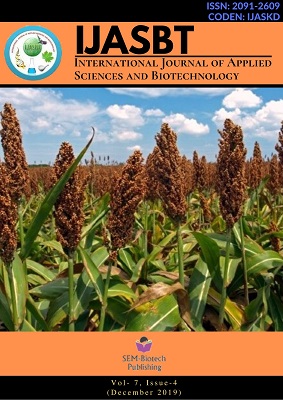Prevalence of Type 2 Diabetes Mellitus at Birat Medical College Teaching Hospital, Biratnagar, Nepal
DOI:
https://doi.org/10.3126/ijasbt.v7i4.26921Keywords:
Type 2 DM (Diabetes Mellitus), Prevalence, Eastern regionAbstract
Type 2 DM is the common and rising on the world wide. The aim of this study is to determine the prevalence of Type 2 DM in eastern region of Nepal. The objectives of this study ware to find out the prevalence of type 2Diabetes Mellitus in different age groups and gender i.e. male & females of eastern region of Nepal.
This was a hospital based retrospective study was carried out between the age group of 0-75 and 76 and above yrs during April 2015 to Feb.2016. Sample size 9,765 subjects who were attended outdoor patient department (OPD) and indoor patient department (IPD) investigated for estimation of blood glucose levels were selected. Family history of Type 2 DM (Diabetes Mellitus) was recorded by questioner. Blood Glucose estimation was performed by Glucose Oxidase Peroxidase (GOD/POD) enzymatic method used. Diagnostic criteria of Type 2 DM recommended by American Diabetes Association and WHO.Statistical analysis was done using Excel.
Total of 9,765 patients were included in the study. Among the total population 9,765 found1, 195 patients elevated casesin which 829/5,612 were males and 366/4,153 were females. The highest prevalence of type 2 diabetes 47.03% in the age group of 26-50 yrs and the second highest was 44.77% in 51-75 yrs age group. Male were found to be higher 69.4% in all the age groups than females 30.6%. Out of 1,195 diabetic patients, 27.20% have family history of Type 2 DM (Diabetes Mellitus).
It has been observed that Type 2 DM is the most common among the age group of 26-50 yrs. It is also evident that the higher prevalence group was found to be males than female’s. Recently it was found that the prevalence of Type 2 DM (Diabetes Mellitus) was increasing which could be due to ignorance of the problems and poor medical service in the country.
Int. J. Appl. Sci. Biotechnol. Vol 7(4): 440-444




